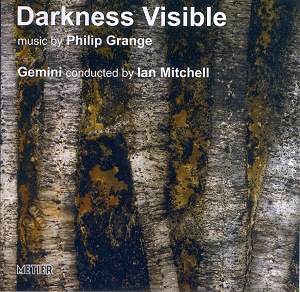I used to think that
Philip Grange, professor of music at
Manchester University was simply a protégé
of Peter Maxwell Davies. PMD. now Master
of the Queen’s Music, gave Grange his
first opportunities when he was asked
to compose for ‘The Fires of London’.
In my naivety I also thought Grange’s
work not unlike Davies’.
Grange tells us in
his informative notes which accompany
the CD that he numbers amongst his teachers
Alan Hacker at York. Hacker was the
redoubtable clarinetist who gave the
‘Fires’ their sound ‘signature’.
I changed my view of
Grange as a PMD disciple a few years
ago when I heard Grange’s fine Piano
Trio (1995). Here, I thought, is a new
voice, and an entirely arresting one
and as unrelated to Maxwell Davies as
possible. With this enterprising new
CD my view has been developed further.
After the demise of
the ‘Fires’ in 1987 Grange was lucky
to find the Gemini ensemble who not
only often employ a similar instrumental
line-up. In addition they are obviously
understanding of his language and in
sympathy with his sound-world. In two
of these works Grange wrote the music
for Gemini. He knows exactly how ‘they
sound’ and they are completely on top
of the music. They play these challenging
works with confidence, with belief in
the music and, under the composer’s
supervision, authority.
It is probably advisable
to hear the pieces in the recorded order;
the shortest first. One is immediately
plunged into an enigmatic world but
one so clearly realized and in which
every detail is heard.
The composer’s notes
refer us to certain literary influences
on these three works starting with ‘Cimmerian
Nocturne’ which opens with a regularly
repeated screeching piccolo. This was
inspired by Joseph Conrad’s novella
‘Heart of Darkness’ with its brooding
and violent atmosphere. There is in
the music, like the novella, a sense
of journeying to a central dark point
and then journeying back again.
Written when the composer
was resident in Taiwan on a sponsored
exchange ‘Lament of the Bow’ takes its
bow, as it were, from a Lament by the
biblical King David on the death of
Jonathan. It "tries to convey some
of the emotions felt during grieving,
as described by Sigmund Freud in his
famous essay ‘Mourning and Melancholia’".
It certainly has a keening quality and
is processional in nature. The various
contrasting elements of the piece are
gradually reconciled.
The Variations, the
longest work here, comes out of William
Golding’s ‘Darkness Visible’ – hence
the CD title. The composer is at pains
to point out that the inspiration for
any of these works is not the various
plots or indeed any specific characters
but the formal design of the literary
source and the atmosphere engendered.
The composer explains the form of Variations
as "three variation cycles each
of which is differently distributed
among the three constituent movements."
The plan of advancing arguments towards
a certain point and gradually combining
them comes from the development of Golding’s
novel. In a conventional sense this
is a set of variations on three themes.
If this sounds a bit
much then it may be worth considering
that when a composer writes his own
programme notes what you invariably
get is a view from over his shoulder
in the workshop. You may not want this
background detail but most composers
feel that you need to know the exact
inspiration sometimes for the sack of
completeness, but also because it can
for some listeners aid and engage their
enjoyment and understanding of an unfamiliar
language.
Metier is doing a terrific
work on behalf of neglected contemporary
British composers and here deliver a
nicely balanced recording. That said,
the volume control may have to be up
somewhat higher than usual.
This is sometimes tough
music but the disc comes with a highly
recommended stamp from me to anyone
patient enough to listen to fine performances
of good contemporary music.
Gary Higginson


